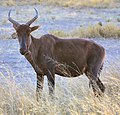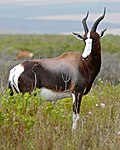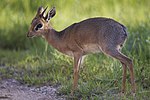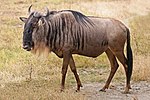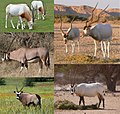The common tsessebe or sassaby (Damaliscus lunatus lunatus) is the southern, nominate subspecies of Damaliscus lunatus, although some authorities have...
20 KB (2,428 words) - 06:37, 9 April 2024
The common warthog (Phacochoerus africanus) is a wild member of the pig family (Suidae) found in grassland, savanna, and woodland in sub-Saharan Africa...
18 KB (1,906 words) - 03:44, 24 June 2024
Damaliscus lunatus (section Common tsessebe)
although this is seen as controversial. Common names include topi, sassaby (formerly also sassayby), tiang and tsessebe. The word tope or topi is Swahili,...
34 KB (4,083 words) - 21:03, 15 September 2024
The common eland (Taurotragus oryx), also known as the southern eland or eland antelope, is a large-sized savannah and plains antelope found in East and...
37 KB (3,875 words) - 11:07, 28 September 2024
The common duiker (Sylvicapra grimmia), also known as the gray duiker or bush duiker, is a small antelope and the only member of the genus Sylvicapra....
5 KB (491 words) - 20:47, 12 May 2024
phillipsi) occurring in the Highveld. The bontebok is related to the common tsessebe. The bontebok is a tall, medium-sized antelope. They typically stand...
6 KB (627 words) - 09:38, 26 June 2023
common hippopotamus (Hippopotamus amphibius) or Nile hippopotamus. The pygmy hippopotamus displays many terrestrial adaptations, but like the common hippo...
33 KB (3,793 words) - 22:26, 17 November 2024
Southern red muntjac (redirect from Common muntjac)
native to Southeast Asia. It was formerly known as the Indian muntjac or the common muntjac before the species was taxonomically revised to represent only populations...
14 KB (1,776 words) - 12:05, 20 November 2024
Beatragus Hirola (B. hunteri) Damaliscus Common tsessebe (D. lunatus) Bontebok (D. pygargus) Alcelaphus Hartebeest (A. buselaphus) Connochaetes Black...
11 KB (1,298 words) - 07:46, 17 September 2024
Blue wildebeest (redirect from Common Wildebeest)
The blue wildebeest (Connochaetes taurinus), also called the common wildebeest, white-bearded gnu or brindled gnu, is a large antelope and one of the two...
44 KB (5,188 words) - 02:52, 5 November 2024
Tragelaphus spekeii T. s. selousi T. s. gratus T. s. spekii Genus Taurotragus Common eland, Taurotragus oryx T. o. oryx T. o. livingstonii T. o. pattersonianus...
7 KB (550 words) - 19:27, 24 October 2024
Beatragus Hirola (B. hunteri) Damaliscus Common tsessebe (D. lunatus) Bontebok (D. pygargus) Alcelaphus Hartebeest (A. buselaphus) Connochaetes Black...
17 KB (912 words) - 23:51, 16 November 2024
The Bangweulu tsessebe (Damaliscus lunatus superstes) is a population and possible taxon of Damaliscus lunatus (topi or sassaby), which are large African...
21 KB (2,557 words) - 12:11, 1 August 2024
Hippopotamus (redirect from Common hippopotamus)
hippopotamuses; also shortened to hippo (pl.: hippos), further qualified as the common hippopotamus, Nile hippopotamus, or river hippopotamus, is a large semiaquatic...
76 KB (8,442 words) - 00:11, 18 November 2024
Wild boar (redirect from Common boar)
The wild boar (Sus scrofa), also known as the wild swine, common wild pig, Eurasian wild pig, or simply wild pig, is a suid native to much of Eurasia and...
134 KB (13,930 words) - 13:21, 17 November 2024
Beatragus Hirola (B. hunteri) Damaliscus Common tsessebe (D. lunatus) Bontebok (D. pygargus) Alcelaphus Hartebeest (A. buselaphus) Connochaetes Black...
13 KB (821 words) - 02:37, 24 June 2024
the desert warthog, while the best-known and most widespread species, the common warthog (or simply warthog), is Phacochoerus africanus. Although covered...
8 KB (552 words) - 17:45, 1 August 2024
gemsbok is monotypic and the East African oryx has two subspecies; the common beisa oryx (O. b. beisa) and the fringe-eared oryx (O. b. callotis). In...
14 KB (1,611 words) - 23:17, 6 October 2024
Beatragus Hirola (B. hunteri) Damaliscus Common tsessebe (D. lunatus) Bontebok (D. pygargus) Alcelaphus Hartebeest (A. buselaphus) Connochaetes Black...
14 KB (1,692 words) - 19:00, 19 November 2024
an endangered mammal to survive beyond infancy. This demonstrated that a common species (in this case, a domestic sheep) can successfully become a surrogate...
13 KB (1,436 words) - 04:03, 17 September 2024
the middle Pleistocene. The original camelids of North America remained common until the quite recent geological past, but then disappeared, possibly as...
23 KB (1,784 words) - 19:41, 18 November 2024
by overhunting and the destruction of its natural habitat. It is not a common species naturally, and the population appears to have been reduced considerably...
14 KB (1,453 words) - 11:17, 31 October 2024
the West Papuan lowlands, the species has become widely dispersed and is common in much of its new range. However its population in its native range has...
10 KB (975 words) - 18:41, 27 October 2024
Beatragus Hirola (B. hunteri) Damaliscus Common tsessebe (D. lunatus) Bontebok (D. pygargus) Alcelaphus Hartebeest (A. buselaphus) Connochaetes Black...
6 KB (537 words) - 08:43, 25 April 2024
from the BaHurutshe), and the Eraraka (or Erarak) clan of Uganda. As is common in many African societies, it is forbidden for the Joof or Eraraka to kill...
21 KB (1,777 words) - 19:25, 30 October 2024
Sheep (redirect from Common sheep)
line of descent from wild ancestors to domestic sheep is unclear. The most common hypothesis states that Ovis aries is descended from the Asiatic (O. gmelini)...
110 KB (12,738 words) - 15:07, 1 November 2024
although the average recorded age in the wild ranges from 15 to 17 years. Common causes of mortality can include avalanches, epidemics and predation. In...
15 KB (1,294 words) - 16:20, 25 August 2024
Beatragus Hirola (B. hunteri) Damaliscus Common tsessebe (D. lunatus) Bontebok (D. pygargus) Alcelaphus Hartebeest (A. buselaphus) Connochaetes Black...
2 KB (76 words) - 06:47, 4 September 2024
Beatragus Hirola (B. hunteri) Damaliscus Common tsessebe (D. lunatus) Bontebok (D. pygargus) Alcelaphus Hartebeest (A. buselaphus) Connochaetes Black...
15 KB (1,573 words) - 12:41, 17 September 2024
they are considered part of the same species as their wild relatives, the common species are to be named Bos primigenius and Bos gaurus. During the 2010s...
14 KB (1,396 words) - 15:51, 19 November 2024

